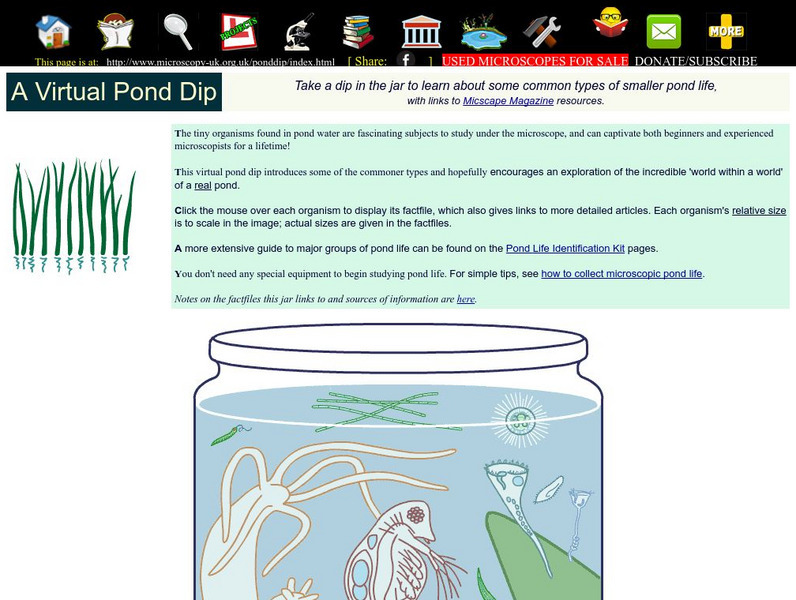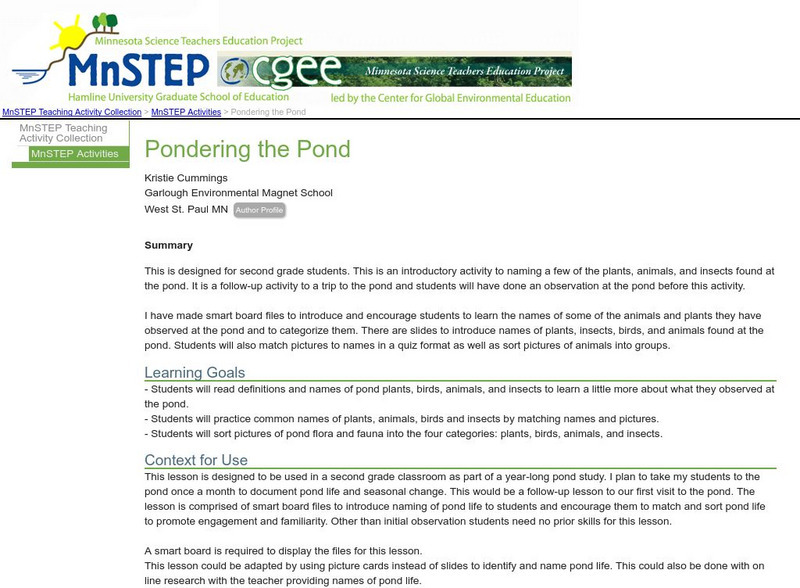Curated OER
Animal Tracks
Students study animals. In this science lesson, students make plaster casts of animals that live in the area. Students identify the tracks.
Curated OER
Models of Succession
Students create a model city in order to understand the effects human habitats have on the environment. In this environment lesson, students examine the effects human habitats have on the environment. Students create a model...
Curated OER
World Wetlands Day
In this World Wetlands Day worksheet, students read or listen to a passage, then match phrases, fill in the blanks, choose the correct words, unscramble words and sentences, put sentences in order, write discussion questions and conduct...
Curated OER
Aquatic Communities
Students watch a video about aquatic communities. They conduct an experiment that shows how movement of rivers change the landscape. They compare fresh and salt water communities and its wildlife.
Curated OER
Water Walk
Students conduct a visual survey to discover information about local land use and water quality; document their findings by mapping and profiling the water body; and use this initial investigation to raise questions about local land use.
Curated OER
Investigating Animals in Water
Young scholars observe small animal activity. They identify local water animals and describe the habitats where water animals can be found. Students collect samples to observe in the classroom.
Curated OER
Precious Water: Is it a Need, a Right, or a Commodity?
Students determine whether water is a need, a right, or a commodity. In this water lesson, students investigate land and water ecosystems through activities. Students also discover water as a resource and energy source as they observe...
Curated OER
Earthworks
Seventh graders explore watersheds and take samples and analyze the data from a watershed in the area.
Curated OER
Where Did It Come From?
Students research island formation, plot locations on a map and make an analysis of why some islands are formed where they are.
Curated OER
What Are We?
Students describe different types of water pollutants. They complete experiments in which they observe the affects of water pollution on algae. They also brainstorm and list three causes of each water pollutant.
Curated OER
Migration Isn't Just For The Birds
Fourth graders explore the concepts of conservation using a reading story that describes a flock of geese. The ecosystems are also described in the lesson and the effects of pollution.
Curated OER
Walking With Thoreau
Students engage in a series of activities geared towards studying the author Henry David Thoreau. They use different sources to obtain information to create context for future lessons. Students attempt to model their own lives to that of...
Curated OER
Tell Me All About It!
Students discuss the importance of comprehension and the use of summarization. Through guided practice, they follow three rules in finding and highlighting important information, while crossing out information that is not needed. Using...
Curated OER
Relating Number of Insect Species to Water Quality
Students are asked to respond to questions such as:" Have there been surveys of the area to inventory the species?" (For example, for a wetland area, do they know what amphibians live there and how abundant they are?) Are there any...
Curated OER
Smog Be Gone
Learners begin the lesson by identifying greenhouse gases. In groups, they observe and record the effect of the gases on the atmosphere and the temperature of the Earth. They participate in activities that describe the role of...
Curated OER
Posters and People
Students create and design posters reflecting the types of litter harmful to aquatic wildlife. They explain the dangers of fishing line to aquatic wildlife, plastic bags to dolphins, and fish nets to fish. They design a poster to...
Enchanted Learning
Enchanted Learning: Pond Life Animal Printouts
Filled with printable pages of both plant and animal pond life, Enchanted Learning features fact sheets with color pictures.
EL Education
El Education: Pond Life Posters
Students gather information about pond life including plants, animals and insects through research field observations, and specimen collections. Students report their information along with original illustrations through a series of...
Microscopy UK
Microscopy Uk: A Virtual Pond Dip
In this site, you will be introduced to some of the more common organisms found in a pond. Contains a thorough guide to small and microscopic pond life with links to other descriptive sources.
Science Education Resource Center at Carleton College
Serc: Investigating Ponds and Streams: How Clean Is Our Water?
For this field lab, students investigate the differences in three city ponds. Students will compare pond life, temperature, pH, Ammonia, dissolved oxygen, and Nitrate. The student use the pond sheets (Flinn Scientific Catalog 2007) to...
Untamed Science
Untamed Science: Biology: World Biomes: Lakes and Ponds Biome
Learn about the biotic and abiotic factors of lakes and ponds as well as learning how lakes form through reading and video clips.
Science Education Resource Center at Carleton College
Serc: Pondering the Pond
After a trip to the pond, students will be able to name plants, animals, birds, and insects found at the pond. They will be able to categorize them and sort them into groups.
Science Education Resource Center at Carleton College
Serc: Mn Step: Who Am I? Plant and Animal Life in a Pond
After learning about pond life, learners play a game where they must ask questions to discover the name of an animal or a plant displayed on a card placed on their backs. A set of images, a questioning sheet, and a list of vocabulary...
Biology Corner
Biology Corner: Biodiversity of Ponds
In this lesson plan site, students will observe and record data on three ponds. The goal is to identify the types of organisms in each pond and prepare a report that delves into the biodiversity of each site. Links to videos about pond...
Other popular searches
- Pond Life Preschool
- Kindergarten Pond Life
- Pond Life Research
- Pond Life Unit
- Pond Life Animals
- Microscopic Pond Life
- Frogs and Pond Life
- Pond Life Mural
- Pond Life Over Time
- Demonstrating Pond Life
- Life in a Pond
- Introduction to Pond Life























